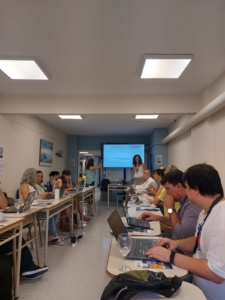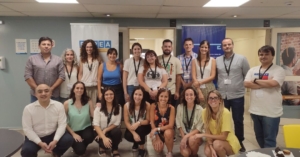On May 23, we were at the presentation of the 5th National Open Government Plan, a public policy instrument co-created with civil society and citizens that contains 7 open government commitments to be implemented by different agencies of the national state. We shared the panel with Delfina Pérez from the National Directorate of Open Government, Andrés Bertona from the Anti-Corruption Office and Florencia Caffarone from Democracia en Red.
“Below, we offer a google translate version of the original article in Spanish. This translation may not be accurate but serves as a general presentation of the article. For more accurate information, please switch to the Spanish version of the website. In addition, feel free to directly contact in English the person mentioned at the bottom of this article with regards to this topic”.
The current Plan was co-created in 2022, from the National Open Government Table, in dialogue with the Network of Civil Society Organizations for the Open State and the rest of the citizens who participated in this process. From Fundeps we are part of the National Open Government Board (2020 – 2022) and from that space we contributed to the co-creation of the 5th Plan, articulating between the National Open Government Directorate and different organizations that were involved in it.
This Action Plan is part of the obligations assumed by Argentina before the Alliance for Open Government, which it joined in 2012. Since then, and every two years, the country co-creates and implements different policies and concrete commitments in this scope.
How was the process of co-creation of the 5th Open Government Plan?
For the first time, and in order to guarantee equal participation among all people located in different parts of the country, this Plan was co-created in its entirety virtually, through meeting platforms, the website argentina.gob.ar and its Public Consultation portal. In turn, within the National Open Government Roundtable, and following the recommendations of the Participation and Co-Creation Standards (2022) of the Open Government Alliance, it was agreed to design a Plan with a maximum of 10 commitments.
For this, a prioritization of topics was carried out in consultation with the Network of CSOs for the Open State. The selected topics were: Environment and implementation of the Escazú Agreement; Public work; Gender and Care Policies; Mental health; Open State and Federalization; Water and Sanitation in the AMBA; Information about health providers; Food and implementation of the Law for the Promotion of Healthy Eating (known as the Frontal Labeling Law). Not all, however, concluded in commitments of the Plan, for various reasons. Especially, and in terms of the implementation of the Law for the Promotion of Healthy Eating, from Fundeps we will continue contributing to the construction of proposals that contribute to the application of said law.
After this, the public instances for the design of the 5th Plan began in August 2022, with a series of Challenge Identification Workshops, for each of the pre-selected topics. Their objective was to jointly identify the challenges that the 5th Plan could respond to. Then, in October, the public instance for the reception of proposals was opened, with the slogan that open government policy solutions be suggested, which can respond to those challenges posed. With these inputs, each government area involved drew up its preliminary commitment drafting, which was submitted to public consultation for comments. At the same time, a dialogue instance was developed for each topic – commitment and finally the final writing was carried out.
What does the 5th Open Government Plan consist of?
The current Plan consists of 7 commitments assumed by different departments of the national government.
| Compromiso |
Dependencia a cargo |
| 1. Participación pública en la toma de decisiones ambientales en el marco de la implementación del Acuerdo de Escazú en Argentina |
Secretaría de Cambio Climático, Desarrollo Sostenible e Innovación – Ministerio de Ambiente y Desarrollo Sostenible de la Nación |
| 2. Participación y control ciudadano en la obra pública |
Dirección Nacional de Transparencia – Ministerio de Obras Públicas de la Nación |
| 3. Mujeres en el sistema productivo federal: más evidencia, menos brecha |
Dirección Nacional de Seguimiento y Evaluación de la Gestión, Secretaría de Industria y Desarrollo Productivo – Ministerio de Economía |
| 4. Salud Mental: desinstitucionalización e inclusión social de personas con padecimiento mental |
Dirección Nacional de Abordaje Integral de la Salud Mental y los Consumos Problemáticos –
Ministerio de Salud de la Nación |
| 5. Acceso a la información y políticas de cuidados |
Dirección de Mapeo Federal de Cuidado – Ministerio de las Mujeres, Géneros y Diversidad de la Nación |
| 6. El acceso a la información y los prestadores de servicios de salud |
Dirección Nacional de Calidad en Servicios de Salud y Regulación Sanitaria – Ministerio de Salud de la Nación |
| 7. Programa Federal de Estado Abierto |
Dirección Nacional de Gobierno Abierto – Jefatura de Gabinete de Ministros
Dirección de Asuntos Municipales – Ministerio del Interior |
Here you can access the details of each of them, from page 37 onwards.
What can citizens and civil society organizations do with the 5th Plan?
Once the Open Government Plan has been designed, the objective is to implement it, in this case, during 2023 and 2024. To this end, any interested person or civil society organization can get involved, either by following up on each stage of its implementation or by participating more actively, when the commitments allow it, in some phases of its fulfillment. In this sense, at least one instance of open dialogue with civil society and citizens interested in the issues addressed was foreseen for each commitment, and the platform Metas de seguimiento del Plan was developed. This seeks to facilitate and energize this implementation instance, which, according to previous experience, is always the most difficult when it comes to articulating and sustaining incentives.
As an organization committed to open government policies and several of the issues addressed in this Plan, we will closely follow and accompany each instance of progress and will be alert to signs of stagnation or setbacks.
It seems to us a great shared achievement, among different organizations that were part of the National Open Government Roundtable, such as the Network of Civil Society Organizations for the Open State, activists and open government policy reformers, that Argentina continues to challenge itself with each new Open Government National Action Plan.
More information
Read about the 5th National Open Government Plan of Action here
Watch the presentation of the 5th Open Government National Plan of Action here
Contact
María Victoria Sibilla, ninasibilla@fundeps.org


